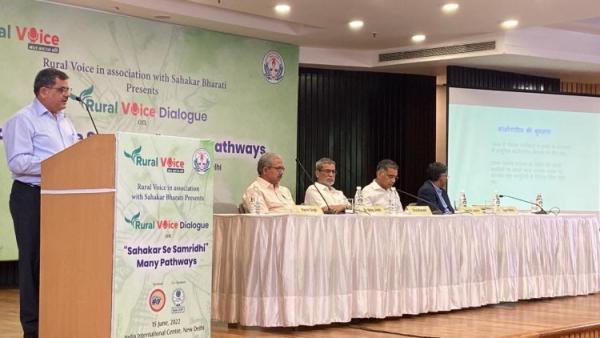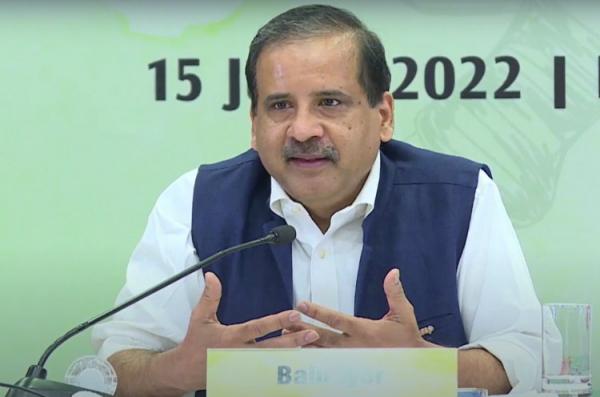
Rural Voice, a media house in India, that focuses on agriculture and rural affairs, in association with Sahakar Bharati, a pan-India organisation of cooperators and cooperatives, organised a Dialogue on “Sahakar Se Samriddhi: Many Pathways” on 15 June in New Delhi. It aimed to identify the challenges that the cooperative movement faces and explore new possibilities to take the movement forward. The experts from the Indian movement who participated in the Dialogue suggested measures like bringing transparency in the functioning of cooperatives, adopting technology, raising incomes of farmers through cooperatives, exploring new fundraising options, including “Cooperation” in the curriculum to involve the youth and increasing the intervention of cooperatives in the service sector.
The Dialogue was organised in three sessions. The first session on “Strengthening cooperatives for better income realization” presented views of Mr. Siraj Hussain, former Agriculture Secretary; Mr. Jayen Mehta, COO, Gujarat Cooperative Milk Marketing Federation, Amul; Mr. Ajay Vir Jakhar, Chairman, Bharat Krishak Samaj; and Mr. Uday Joshi, National General Secretary, Sahakar Bharati. The second session on “Global experience in cooperation: How India can benefit” presented the views of Dr. Chandrapal Singh Yadav, President, ICA-AP; Mr. Konda Reddy Chavva, Assistant FAOR, Food and Agriculture Organisation of the UN (FAO); Mr. Balasubramanian Iyer, Regional Director, ICA-AP; and Mr. Satish Marathe, Director, Reserve Bank of India (RBI). The third session discussed the “Way forward to make cooperatives relevant” with Dr. Saswata Biswas from the Institute of Rural Management Anand (IRMA); Mr. Prakash Nalknavare, MD, National Federation of Cooperative Sugar Factories Ltd; Mr. Ram Iqbal Singh, National Federation of Farmers' Procurement, Processing and Retailing Cooperatives of India Ltd, (NACOF); and Dr. DN Thakur, President, Sahakar Bharati.

Opening the second session of the Dialogue, Dr. Yadav, President said the cooperative movement is necessary for the growth of a country like India. Globally, 12% of the population is associated with about 30 lakh cooperatives that significantly contribute to the global economy. The top 300 cooperatives have generated an annual turnover of USD 2.18 trillion as per the latest ICA World Cooperative Monitor (2021). He suggested that “Cooperation” should be taught as a subject in higher education and emphasized the need for training to run the cooperatives professionally.

Mr. Iyer said that cooperatives needed to look across sectors and have to change the perception of being limited to agriculture and credit. There is a growing need for cooperatives in the services sector. He said that the contribution of the services sector to India’s GDP was more than 50% but a large part of it was informal. Citing examples from other countries of the Asia-Pacific region, he emphasized the need for an image makeover of cooperatives, adoption of technology, capital infusion, expansion to the social and services sector, and focus on governance issues.
The Ministry of Cooperation, Government of India is formulating a new National Cooperation Policy, for which it has started consultations with various stakeholders. The key takeaways from the Rural Voice Dialogue will be shared with the Government for consideration.
The full report of the dialogue can be read here.



